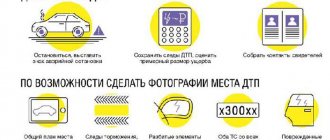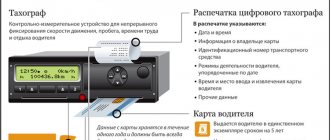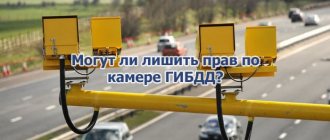Who is responsible for traffic police fines for legal entities?
A fine can be issued to the driver or the owner - in the case of a company car, this is a legal entity. A fine is possible even if the tenant or hired driver violated the rules.
Entity. Fines for violations of rules committed in a company car are most often issued to the company. This is due to the fact that most violations are recorded by a camera, but it does not know who is driving, and the fine is tied to the owner.
Fines for a legal entity for violating traffic rules are the highest, they are measured in tens and hundreds of thousands of rubles. In order not to pay a large amount, the organization has the right to challenge the fine and identify the real offender or deduct the fine from the employee’s salary. There are exceptions when this is prohibited:
- force majeure circumstances, such as a collision of several vehicles in the same lane;
- extreme necessity, for example when the driver was trying to avoid a rockfall.
A driver driving a company car may receive a fine personally if the car is stopped by a traffic police officer. The inspector will record the violation and enter the license number into the protocol - the decision will be issued to the individual.
Official of the organization . The Code of Administrative Offenses contains more than 20 fines that can be imposed on an official - for example, on the person responsible for releasing cars onto the line. As a rule, such fines are lower than for legal entities. Among them:
- release of a machine without registration, technical inspection or with malfunctions;
- allowing a drunk driver or a person without a license to drive;
- installation of false license plates, illegal flashing lights;
- driving a heavy truck with violations;
- violation of the rules for transporting children.
How to check fines correctly?
In fact, a legal entity can find out about the presence of fines in the same ways as an individual. In all cases, you will need either vehicle data (license number and registration certificate number) or driver's license data to view the sanctions issued for a specific driver.
But we’ll tell you below how to check all the cars at once if there are several of them in the legal entity’s fleet.
Is it possible to look at the TIN and how?
Unfortunately, in 2021, there is no implementation of checking the presence of traffic police fines by TIN using the simple “enter TIN - list of fines” method. You'll have to go through a difficult path!
And today the only option for checking fines is the State Services portal. The legal entity will have to register here first if you have not already done so. This will require an electronic digital signature.
But then, after authorization, you can add all the cars belonging to the organization and track traffic police fines for all these cars of the legal entity. Moreover, you can set up notifications about the receipt of new regulations and, thus, track fines in an almost timely manner.
Amounts of traffic police fines for legal entities
The fine for legal entities is often higher than for an individual driver, but it may be the same. Let's look at examples.
For hitting the lawn. This fine is set by regional authorities. For example, in Moscow, for hitting a lawn, the company owner of the car will be fined 300 thousand rubles. The fine for a driver will be 5 thousand rubles, for an official - 30 thousand rubles.
For unpaid parking. Such a fine in Moscow is imposed by the Administrator of the Moscow Parking Space (AMPP) or the Moscow Administrative Road Inspectorate (MADI). Its size is the same for individuals and legal entities - 5 thousand rubles.
In the regions, fines are lower: in St. Petersburg and Yekaterinburg - 3 thousand rubles, in Kazan - 2.5 thousand, in Krasnodar and Perm - 1 thousand rubles. We wrote in detail about fines for unpaid parking.
For the unpaid Plato system. “Platon” is a system for collecting tolls for heavy trucks on federal highways. The state collects money from them and uses it to build and repair roads. If you don’t pay, you will be fined 5 thousand rubles the first time, and 10 thousand rubles the second time. For legal entities the amounts are the same.
See the full table of fines for drivers, officials and legal entities.
When is a traffic police fine imposed on a legal entity?
A legal entity is an organization that has separate property and is liable for its obligations. The company may enjoy civil rights and bear responsibilities. A legal entity must be registered in the Unified State Register of Legal Entities in one of the organizational and legal forms (Article 48 of the Civil Code of the Russian Federation).
Attention! If you have any questions, you can chat for free with a lawyer at the bottom of the screen or call Moscow; Saint Petersburg; Free call for all of Russia.
To manage transport owned by a legal entity. persons who hire drivers. The company interacts with them on the basis of an employment contract, acting as an employer. Drivers do not always comply with the traffic rules of the Russian Federation, which entails a fine from the traffic police. It must be paid by the owner of the car if the violation is recorded using cameras (Article 2.6.1 of the Code of Administrative Offenses of the Russian Federation). The company is obliged to compensate for the harm caused by the employee. This rule is enshrined in Article 1068 of the Civil Code of the Russian Federation.
When the driver is stopped by an inspector, a report is drawn up against the person driving the car. However, if the vehicle is owned by an organization, information about it will be included in the document. The traffic police imposes a fine on the driver for classic violations such as speeding, failure to comply with markings, or driving through a prohibitory traffic light sign. However, there are a number of cases in which the inspector will hold the organization accountable. A complete list of situations that entail the application of traffic police fines to a legal entity is presented in the table below.
How to track traffic police fines for legal entities
Checking traffic police fines for legal entities by mail. The traffic police and other government agencies notify you of fines by mail. A letter with a decision on an administrative offense arrives at the company’s legal address. However, sometimes letters do not arrive, so it is better to regularly check fines online.
Check online. This can be done at:
- official website of the traffic police. Click on the “Check fines” banner on the main page, enter the license plate number and vehicle registration certificate number of the vehicle you want to check. You will have to check one machine each time.
- through the mass fine check service. Sign an agreement with the “Staff Traffic Police Fines” service and receive up-to-date information about fines for all the company’s cars at once.
How to track traffic fines for a legal entity
Decrees can be received in the traditional way - by registered mail. Or you can check online: on the official website of the State Traffic Safety Inspectorate or the State Services portal (for Moscow - the Autocode portal). All options have features and disadvantages. The main “minus” is a large amount of manual work, the history of fines for the fleet is not saved, different sources show only their own, separate types of fines.
For example, you have 50 cars in your fleet. Every week (or even more often) you check them manually using the vehicle registration certificate number and vehicle registration number. Find out the details: time, place of violation, payment details. Looking for the driver who was driving. Next, you create a payment order (if you pay through a bank account organization) or instruct the driver to pay. After that, you control the repayment of the fine. Imagine the amount of work if there is at least 1 fine per day for each car.
At the same time, on the traffic police website you can only check traffic police fines. And there are also fines from MADI, AMPP, and administrative commissions of municipalities.
The service will help you control vehicle fleet fines automatically without significant labor costs:
In the table we compared the capabilities of the State Services website, the State Traffic Safety Inspectorate and the Online State Traffic Safety Inspectorate
| Possibilities | Public services | GIBDD.rf | Online traffic police |
| Special verification of legal entities. faces | required | No | No |
| Fines according to the organization’s TIN | — | ||
| Filling in vehicle data during the next fine check | No | required | No |
| Checking the traffic police, MADI, AMPP | — — | ||
| Data from bailiffs | — | — | |
| Definition of offender | — | — | |
| Information about the time and place of the offense | |||
| Photo of the offense | — | ||
| Notification of fines to the person responsible by e-mail and SMS | — | — | |
| Uploading payments to the client bank | — | — | |
| Online payment of fines | — | through third party services | |
| Cashless payment of fines, repayment control | — | — | |
| Access to information about fines if the state payment system GIS GMP is unavailable | — | — | |
| Various types of search (filters) in the database | — | — | |
| Export information about all fines to Excel tables | — | — | |
| Integration of the service into your automated control system | — | — | |
| Free consultations on payment and repayment of fines | — | — |
How to pay traffic police fines to a legal entity
Through the organization's current account. If you have a paper order on hand, the accountant can take the details from it and fill out the payment order. You will have to pay one fine each.
Online using a bank card. If you check fines online, for example on the traffic police website, you can pay by card. At the same time, the traffic police warns that payment goes through third-party systems and the inspectorate is not responsible for paying off the fine.
According to the invoice. If you enter into an agreement with Traffic Police Fines, the service will issue an invoice for fines for all cars at once.
Payment methods for traffic police fines for legal entities
Typically, fines for legal entities are paid through the organization's current account or by credit card online.
How to pay through an organization's bank account
- Find out the details. They are indicated in the paper order. On the website of the State Services or the State Traffic Safety Inspectorate, you can print out a receipt for payment and find the required fields there.
- Fill out the payment order. It is very important to do this correctly by filling out all fields correctly. Otherwise, the fine will not be paid.
The disadvantage of this option is that you need to fill out and pay payment slips one by one and manually. If dozens or even hundreds of fines have accumulated, the process will drag on for hours.
Pay online using a bank card
- Check fines for each vehicle
- Choose a payment service.
- Pay online.
This option is more convenient, but you have to pay a larger commission when making payments. Each time you need to request copies of documents confirming payment. The history of charges and payments is not saved, and sometimes you need this information to be at hand for all your own cars.
Pay fines via Online Traffic Police (3 payment options)
By bank card through your personal account. The entire payment history with payment details and receipts is stored and available to you 24/7.
Through the client bank from your current account. You can upload payment orders to your client bank from your Online traffic police account. Payment details will be filled in automatically. This will significantly save the accountant’s time and prevent errors when filling out.
Cashless payment of fines through the service. In this case, Online Traffic Police:
- pays organization fines for you;
- checks their repayment
- is responsible for paying off each order
You save time and don't worry about paying off fines. Copies of payment orders and details of each fine will be saved in your personal account.
Pay the fines of the organization
Pay
Remember
- Fines for legal entities are the highest, up to 500 thousand rubles for one violation.
- If a violation of the rules is caught on camera, the legal entity will be fined. It doesn't matter who was driving.
- The company can challenge the fine or deduct it from the driver's salary.
- If a driver in a company car is stopped by an inspector, he will most likely be fined personally.
- Sometimes officials are fined for violations - mainly those responsible for releasing cars onto the line.
- You can find and pay fines for legal entities on the traffic police website, then you will have to search for one car at a time. It’s easier to sign an agreement with a mass verification service.
All articles by the author: Ilya Novikov
How can a legal entity appeal a decision?
And again, everything is exactly the same as if the complaint was filed by an individual. We have the most detailed article on the procedure for appealing traffic police fines.
The only things we remind you here are:
- the legal entity must be indicated in the header of the appeal application (if the fine is issued specifically to the organization),
- In addition to the signature, in the place of signature of the sample application-complaint, you must also put the seal of the organization,
- even if a legal entity has an electronic digital signature, it is not yet possible to challenge the fine online (see note on the official website of the traffic police),
- The deadline for filing a complaint is the same - 10 days from the date of receipt of a copy of the decision (but there are nuances for evading receiving the decision).
The process of appealing a traffic police fine by a legal entity
The company has the right to try to challenge the imposed traffic fine. The obligation to pay the monetary penalty will be removed from the organization if it can prove that the punishment was imposed unlawfully, or the employee used the car for his own personal purposes and did not fulfill official duties at the time of the violation.
The right to appeal a decision is enshrined in Article 30.1 of the Code of Administrative Offenses of the Russian Federation. The regulatory legal act regulates the process of performing the procedure. An authorized representative acts on behalf of a legal entity on the basis of a power of attorney. He draws up a complaint, which reflects all the claims, and applies to one of the following authorities:
- to the head of the traffic police department, whose employee issued the order;
- to the prosecutor's office;
- to the district court;
- to a higher court if the company is not satisfied with the judge’s decision.
The complaint form is not legally established. In order for a document to be considered, it must contain a number of mandatory information:
- the full name of the institution to which the complaint is being sent;
- information about the applicant (full name of the company, legal address, information about constituent documents);
- the reasons that prompted the initiation of the appeal procedure;
- references to the norms of current legislation confirming the applicant’s correctness;
- the requirements put forward;
- signature of an authorized representative with a transcript;
- date of registration and wet seal of the organization.
The company may have its own form on which applications are submitted to government agencies. Use of the document is acceptable. If a personal paper has not been developed, a standard complaint form must be used.
claims with a complaint about a traffic police fine can be found here.
The deadline for contacting the authorized body is set forth in Article 30.3 of the Code of Administrative Offenses of the Russian Federation. The complaint must be sent within 10 days. The period begins to be calculated from the date of delivery of a copy of the decision. The missed period can be restored. To do this, you will need to submit a petition. It is important to communicate the reasons that led to the missed deadline. The decision is made by the judge or official to whom the paper is sent. If the reasons are considered valid, the period will be restored, and the organization will have the right to file a complaint against the traffic police fine.
The period for consideration of the complaint depends on the authority to which the document was submitted (Article 30.5 of the Code of Administrative Offenses of the Russian Federation). The period will be:
- 10 days if the document is sent to an official;
- 2 months if the complaint is sent to court.
The company will then be notified of the response. The complaint may be rejected, satisfied in whole or in part. If the decision made does not suit the legal entity, it is permissible to appeal to a higher authority.
Checking fines by a legal entity through the traffic police website
Using the official website of the traffic police is considered one of the easiest ways to check fines. The service is provided free of charge. To use it, you need to know the registration number of the vehicle and the information contained in the vehicle’s STS. To perform a search, a legal entity will need to perform the following actions:
- Visit the official website of the State Traffic Inspectorate. In the top panel, select services and go to the section for checking fines.
- Provide information about the state registration plate and STS certificate.
- Click on the “request verification” button and wait for the system to perform a search.
- Review the information received.
The search may return one of several results. If the vehicle of a legal entity does not have traffic fines on it, a message will appear stating that there are no records in the database that match the request. When monetary penalties for violation of traffic rules are imposed, after entering information about the state number and registration certificate, the system will redirect the user to a page containing the following information:
- date of commission of the offense;
- link to the article of the Code of Administrative Offenses of the Russian Federation, on the basis of which the traffic police fine was imposed;
- information about the traffic police department whose employee issued the penalty;
- number and date of the resolution;
- amount of recovery.
If you hover your cursor over the article number of the Code of Administrative Offenses of the Russian Federation, the system will provide a detailed description.
There is also a 3rd option for the result. If the data is entered with an error, the system will report that the information was entered incorrectly.
Procedure for paying a fine by a legal entity
It is necessary for a legal entity to pay traffic police fines in accordance with the provisions of Article 32.2 of the Code of Administrative Offenses of the Russian Federation. Legal entities make payments using non-cash methods. Cash amounts are not provided. Funds are debited from the organization's account. Transfers are necessarily recorded in accounting as other expenses.
Subsequently, the company has the right to demand reimbursement of expenses from the employee. The rule is provided for in Article 1081 of the Civil Code of the Russian Federation. The amount of claims does not exceed the amount of compensation paid for the traffic police fine, unless otherwise provided by law.
Responsibility of legal entities persons for drunk driving. | Khanty-Mansiysk
A decision in a case of an administrative offense on bringing to administrative liability can be appealed in the manner established by Chapter 30 of the Code of Administrative Offenses of the Russian Federation.
Code of Administrative Offenses of the Russian Federation
Article 30.2. The procedure for filing a complaint against a decision in a case of an administrative offense
1. A complaint against a decision in a case of an administrative offense is submitted to the judge, body, official who issued the decision on the case and who are obliged to send it with all the materials of the case to the appropriate court, higher body, or higher official within three days from the date of receipt of the complaint face.
2. A complaint against a judge’s decision to impose an administrative penalty in the form of administrative arrest or administrative expulsion must be sent to a higher court on the day the complaint is received.
3. A complaint can be filed directly with the court, a higher body, or a higher official authorized to consider it.
4. If consideration of the complaint does not fall within the competence of the judge or official by whom the decision in the case of an administrative offense is appealed, the complaint is sent for consideration according to jurisdiction within three days.
5. A complaint against a decision in a case of an administrative offense is not subject to state duty.
6. A complaint against a judge’s decision to impose an administrative penalty in the form of administrative suspension of activities must be sent to a higher court on the day the complaint is received.
Article 30.3. Time limit for appealing a decision in a case of an administrative offense
1. A complaint against a decision in a case of an administrative offense may be filed within ten days from the date of delivery or receipt of a copy of the decision.
2. If the deadline provided for in Part 1 of this article is missed, the specified period, at the request of the person filing the complaint, may be restored by a judge or official authorized to consider the complaint.
3. Complaints against decisions in cases of administrative offenses provided for in Articles 5.1 - 5.25, 5.45 - 5.52, 5.56, 5.58 of this Code may be filed within five days from the date of delivery or receipt of copies of decisions.
4. A ruling is issued on the rejection of the petition to restore the period for appealing the decision in the case of an administrative offense.
Good luck to you!











